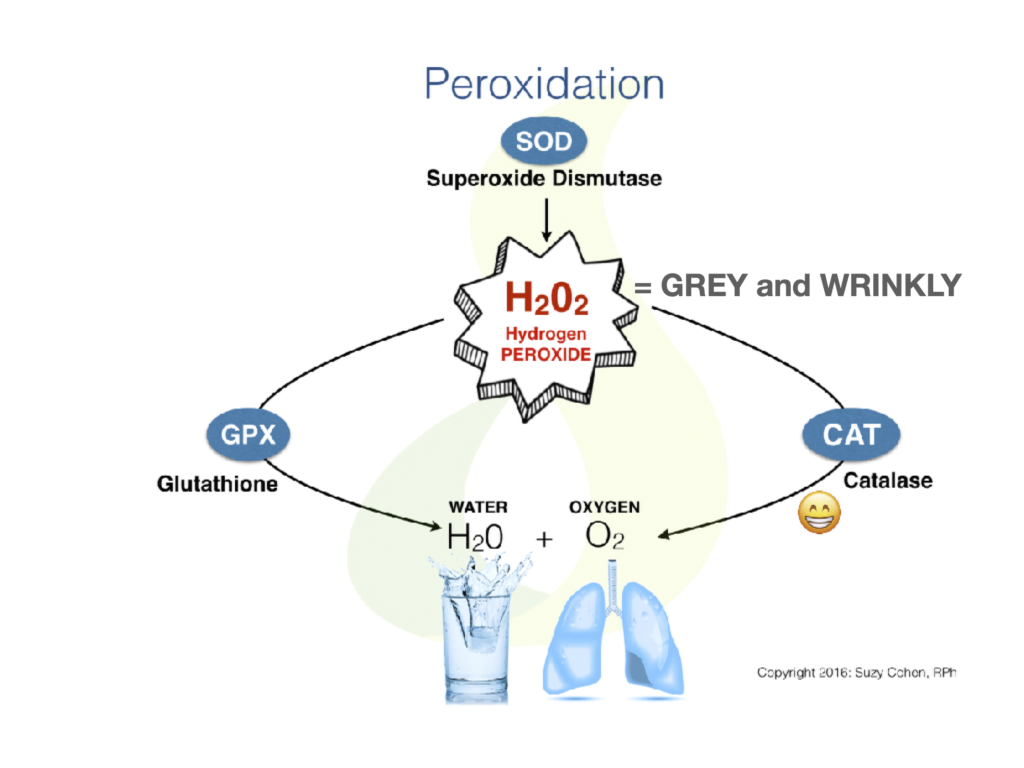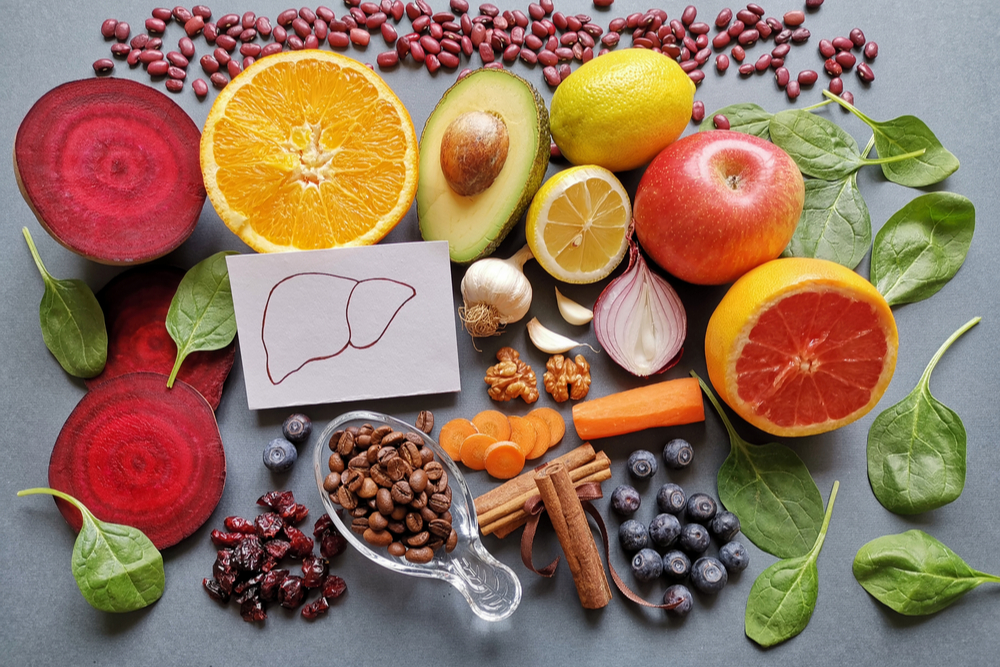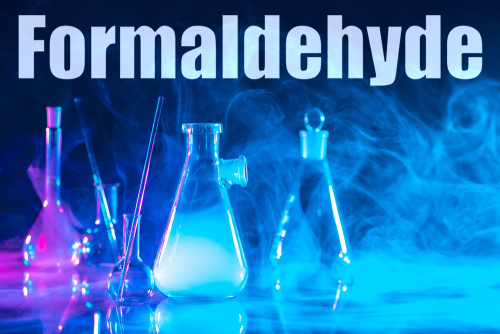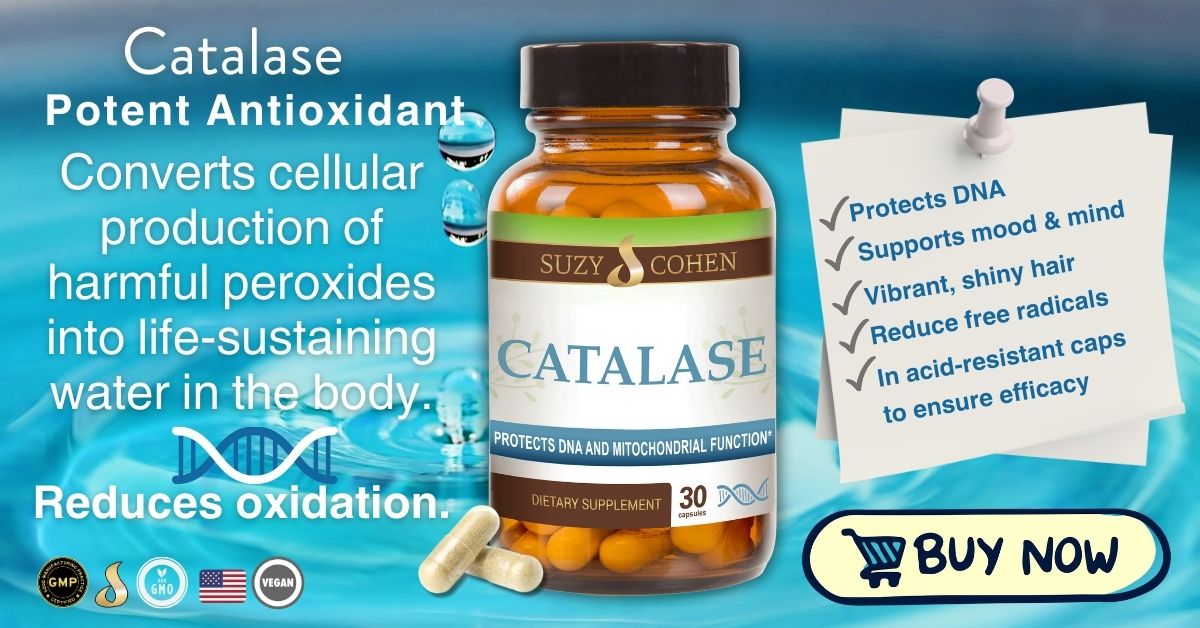What's On This Page?
ToggleCatalase is an important enzyme you make in your liver, just like glutathione. These are both strong antioxidants.
It’s incredibly important to your health and I hope you are still making enough of it. If you’re not, all kinds of health problems can ensue.
That’s because catalase breaks down a poison, turning it into water and oxygen. If you don’t have enough of this antioxidant, the poisonous compound “hydrogen peroxide” builds up in your tissues, arteries and all of your organs. Your thyroid status will suffer too. People with thyroid illness sometimes create excessive amounts of cellular peroxide. If you’d like to understand that concept a bit more, read this article I wrote: Catalase Neutralizes Peroxide and Offers 3 Healing Benefits.
Therefore, someone with thyroid disease may benefit from more catalase production (or supplementation) in order to have more molecules of hydrogen peroxide neutralized. This is a little-known fact that could make you feel better and if you read the reviews for my supplement, you may like it’s effect on your hair, skin and nails too.
One catalase molecule can convert millions of hydrogen peroxide molecules to water and oxygen each second!
You could say it prevents “rusting” in a way! Reducing peroxide via catalase enzyme is therefore considered anti-aging, it reduces the speed at which one rusts (feels gloomy or turns grey).

Genetics
We know this because aberrations in the genetic CAT code (think SNP!) will cause the CAT gene to stop producing normal, healthy amounts of the enzyme catalase. This can lead to premature greying of the hair.
Catalase is used commercially in the dairy industry to remove peroxide from milk prior to making cheese. It protects garments from peroxide during the fabric-making process, especially polyester. Contact lens makers rinse the peroxide off with catalase.
In the human body, catalase acts like a vacuum cleaner, similarly to glutathione, another potent antioxidant. It can help with hypertension which is a silent disease that leads to devastating consequences if not controlled.
There was an important study about this. Researchers studied one of the most popular blood pressure medications of all time called “lisinopril.” Brand names vary. The researchers evaluated the effect of lisinopril on cholesterol and blood pressure, because as you know, an increase in either of those raises risk for heart attack and stroke.
The researchers determined that lisinopril did not have any impact on lipids or cholesterol, after all it is for hypertension. But the interesting thing is that they noticed a catalase connection. The higher the blood pressure was in a participant, the lower the amount of the enzyme present!
Lisinopril May Raise Catalase in RBC
Lisinopril seems to work, at least in part, by raising your catalase levels, specifically in your red blood cells (rbc). This in turn, will improve blood pressure numbers, both systolic and diastolic.
This suggests that lisinopril has a secondary mechanism of action… the first being that it’s an ACE inhibitor and the second being it raises RBC (red blood cell) catalase! And would supplements do the same? No one can say and the reason is that the drug is raising endogenous levels of catalase.
No supplement was given to these participants and besides dietary supplements do not cure diseases and no claims can be made in that regard according to current FDA guidelines. I want to be clear in case they read this, I am referring to the catalase enzyme you make inside your body.
The information I’m sharing is based upon an article entitled, “Can Erythrocyte Catalase Regulate Blood Pressure?” which was published in 2016.
Your body manufactures its own catalase, the key is to have more of it! Remember, it’s made in your liver every day. It is a potent antioxidant that is needed to break down peroxide.
Sources
1. Supplements – however we don’t know if these work like your endogenous enzymes. No claims can be made. If you buy supplements of catalase, make certain that the enzyme is placed in an acid-resistant capsules or they won’t work because your stomach acid will destroy it.
2.. Cruciferous vegetables – This category includes broccoli, turnip greens, Swiss chard, cabbage, kale and collards. These are fairly rich sources of the antioxidant. Eating plenty of these green leafy vegetables also sparks your own body’s production of it.
Doctors at A&M University conducted some research to see if there were any anti-cancer benefits to rats that were fed a diet high in crucifers. They evaluated catalase levels too. Animals fed the most cruciferous vegetables had significantly higher amounts of catalase (S.O.D. and glutathione) in their liver, compared to the animals not fed with crucifers.
3. Liver and other organ meats and proteins are high in catalase.
See my featured image above for foods that support the liver, many of which spark production of your own catalase enzyme. 
Glutathione.
I mentioned glutathione at the beginning and it is needed to destroy formaldehyde. You may think you don’t need to worry about formaldehyde, because you are not currently ’embalmed’ with formalin, however, formaldehyde is present in living people too.
You may not realize if you’ve been exposed to formaldehyde because it is found in many household products like the vapor from strong glues and pain/lacquer, clothing made with polyester, nylon or acrylic, pesticides, fertilizers, preservatives in medications and vaccines, some famous cosmetic brands and many fabric softeners.
Formaldehyde is shockingly a naturally occurring chemical, just like hydrogen peroxide is! And so your body produces small amounts of formaldehyde every few seconds.
It’s up to glutathione to break it down. Catalase plays a small role too, further upstream.
But again, formaldehyde is made INSIDE the body – made “endogenously” and brain levels are commonly elevated in people with neurodegenerative conditions. Although the toxic burden of excess of formaldehyde (or poorly cleared formaldehyde, whatever the case may be), has been studied, very little is known about the molecular mechanisms underlying its neurotoxicity.

I think we can all surmise that tons of oxidative damage is occurring! Between peroxide and formaldehyde, it’s a lot of inflammation! You want to hope that your liver is in good shape to neutralize those poisons.
This is a much bigger deal than you may think. When those chemicals build up in your cells, it raises risk for dozens of symptoms and diseases among them conjunctivitis, wheezing, asthma, cancer, depression, heart attack, and stroke.
The risk goes up for people who have compromised liver function (fibrosis, cirrhosis, steatosis) or liver failure due to chronic illness, hepatitis, drug abuse or alcoholism or even prescribed use of “hepatotoxic” types of medications. You may be interested in my other article, The Art of Detoxification.
You can self-order liver function tests. As far as other supplements that support the liver, there are many including N.A.C., sarsaparilla, milk thistle, artichoke extract, chamomile, dandelion root, plantain and several others.

Suzy Cohen, has been a licensed pharmacist for over 30 years and believes the best approach to chronic illness is a combination of natural medicine and conventional. She founded her own dietary supplement company specializing in custom-formulas, some of which have patents. With a special focus on functional medicine, thyroid health and drug nutrient depletion, Suzy is the author of several related books including Thyroid Healthy, Drug Muggers, Diabetes Without Drugs, and a nationally syndicated column.


